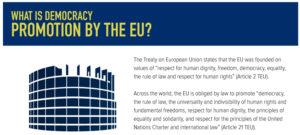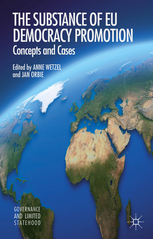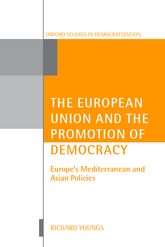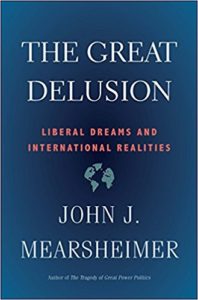 The MEP tasked with setting the European Parliament’s position on the EU’s planned support for NGOs has proposed a billion-euro program for promoting democratic values and civil society. The effort is part of the EU’s next long-term budget, set to start from 2021, which is under discussion among member states and the parliament, EU Observer reports:
The MEP tasked with setting the European Parliament’s position on the EU’s planned support for NGOs has proposed a billion-euro program for promoting democratic values and civil society. The effort is part of the EU’s next long-term budget, set to start from 2021, which is under discussion among member states and the parliament, EU Observer reports:
 The EU Commission in May in its budget plan proposed to bundle together some existing programs under the new ‘Justice, Rights, and Values Fund’ to support NGOs protecting European values – which have come under attack in several member states.
The EU Commission in May in its budget plan proposed to bundle together some existing programs under the new ‘Justice, Rights, and Values Fund’ to support NGOs protecting European values – which have come under attack in several member states.
Swedish Green MEP Bodil Valero plans to almost double the funding for the program in her report due to be presented Wednesday (10 October) afternoon at the meeting of the EP’s civil liberties committee.
“When it comes to the support for human rights organisations outside and watchdogs and monitoring and so on, we give a lot of money [to other countries] but we have nothing for Europe. And we are in a situation where we really need a lot of money also for the human rights organisations in Europe,” she said.
 Spreading liberal democracy around the world is said to make sense from both a moral and a strategic perspective, argues John J. Mearsheimer, the R. Wendell Harrison Distinguished Service Professor of Political Science at the University of Chicago.
Spreading liberal democracy around the world is said to make sense from both a moral and a strategic perspective, argues John J. Mearsheimer, the R. Wendell Harrison Distinguished Service Professor of Political Science at the University of Chicago.
“For starters, it is thought to be an excellent way to protect human rights, which are sometimes seriously violated by authoritarian states. And … proponents claim it helps protect liberalism at home by eliminating authoritarian states that otherwise might aid the illiberal forces that are constantly present inside the liberal state.”
This conventional wisdom is wrong. Great powers are rarely in a position to pursue a full-scale liberal foreign policy, he writes for The National Interest.
Because liberalism prizes the concept of inalienable or natural rights, committed liberals are deeply concerned about the rights of virtually every individual on the planet, he contends in an excerpt from the new book The Great Delusion: Liberal Dreams and International Realities:
 This universalist logic creates a powerful incentive for liberal states to get involved in the affairs of countries that seriously violate their citizens’ rights. To take this a step further, the best way to ensure that the rights of foreigners are not trampled is for them to live in a liberal democracy. This logic leads straight to an active policy of regime change, where the goal is to topple autocrats and put liberal democracies in their place. Liberals do not shy from this task, mainly because they often have great faith in their state’s ability to do social engineering both at home and abroad.
This universalist logic creates a powerful incentive for liberal states to get involved in the affairs of countries that seriously violate their citizens’ rights. To take this a step further, the best way to ensure that the rights of foreigners are not trampled is for them to live in a liberal democracy. This logic leads straight to an active policy of regime change, where the goal is to topple autocrats and put liberal democracies in their place. Liberals do not shy from this task, mainly because they often have great faith in their state’s ability to do social engineering both at home and abroad.
Despite the polarization of U.S. politics, there is still a relatively nonpartisan commitment to advancing democracy, says Ambassador Derek Mitchell, the president of the National Democratic Institute.
“I absolutely think there’s a nonpartisan vision – a bipartisan vision and nonpartisan vision,” he told a recent CSIS forum on democracy promotion and foreign policy.
In light of the current democratic recession and authoritarian resurgence, it is important to recall how much progress has been made, says his Republican counterpart.
 “I would recall that when the National Endowment for Democracy was established, South Korea was a military dictatorship that actually pursued dissidents abroad and was rather a nasty place,” said Dan Twining, the president of the International Republican Institute.
“I would recall that when the National Endowment for Democracy was established, South Korea was a military dictatorship that actually pursued dissidents abroad and was rather a nasty place,” said Dan Twining, the president of the International Republican Institute.
“Look at South Korea today. It’s one of the most extraordinary stories of democratic prosperity in Asia. South Korea’s a very – is a rich country, right? We talk about the Asian tigers. Most – I mean, South Korea’s, like, five times richer than China per capita. It is a real accomplishment.”







